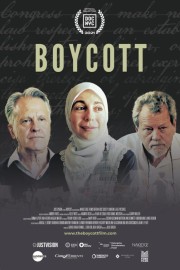Boycott
**Seen at the 2022 Atlanta Film Festival.
There are several issues that complicate the Isreali-Palestinian conflict- too many to discuss in a single film review. One of the thorniest, without question, is how- to many ears- criticism of Isreali policy regarding Palestine is equated with antisemitism. It’s not a new topic, to be sure, and certainly, there are many unafraid to be hostile and antisemetic against the Jewish people as a whole in their criticism of Isreal, but- as illustrated in Julia Bacha’s documentary- it’s taken on an insidious new front legislatively. “Boycott” is a much-needed wake-up call, as it brings to our attention an attack on freedom of speech that could have far-reaching effects.
Economic boycotts have been valid forms of protest going back to the Boston Tea Party. In the Civil Rights movement, they helped lead the South into being segregated, and were a form of protest against apartheid in South Africa in the 1980s. That last one is most important, because in recent years, a lot of companies and individuals are starting to ask for BDS- Boycott, Divestment, and Sanctions- protests against Isreal to protest their treatment of the Palestinians, which many see as akin to South African apartheid. In response, we’ve seen 33 state legislatures in America- from both sides of the political spectrum- pass anti-BDS laws in support of Isreal. Going with these is a requirement for contractors with business with the state to acknowledge, as part of their contract with the state, they will not partake in any boycotts of Isreal. A total of 10 people have filed suit against these laws, all claiming a violation of freedom of speech, but this film centers on three- Bahia, a Texas speech therapist whose family lives in the West Bank; Alan, the editor of The Arkansas Times with a conservative background; and Mikkel, an attorney in Arizona whom, after a trip to Isreal to celebrate his son’s birthday, decides to boycott companies complicit in the occupation.
There are two things that are central to “Boycott’s” success that Bacha has done: 1) she maintains the film’s focus on the freedom of speech issues inherent to these laws, without diving into the complications of the conflict itself, and 2) she focuses on three very different individuals, each with their own perspectives on the issue. Along the way, we also get interviews with Brian Hauss, a lawyer with the ACLU whom is working Alan’s case through the courts; Bart Hester, the conservative State Senator in Arkansas whom first introduced that state’s bill; and Itamar Benzaquen, an investigative journalist in Isreal whom is looking into Isreali financial backing for lobbying in the United States that might be behind these bills, and the politicizing of the issue. We get a full perspective on the legal impacts of what these bills represents, the interests bringing them to the table, and what could be next. The music is probably too insistent at times, but the story is urgent, and important, to bring to people. Regardless of your views on the conflict, an attack on our freedoms to voice our opinions on them should not be negotiable.










